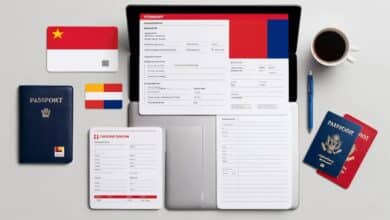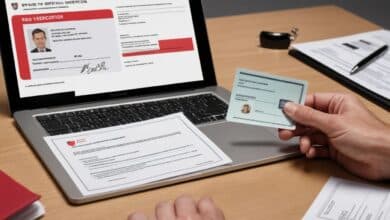Why Nurses Are Choosing Oslo for Sponsorship: Benefits and a Guide to Apply
Global healthcare workers increasingly seek opportunities in Scandinavia, with Norway’s capital emerging as a top choice.
Competitive salaries, progressive workplace policies, and robust support systems make this city stand out for medical professionals.
Recent reports show annual earnings averaging between NOK 459,000 and NOK 537,660 for qualified practitioners. Employers often provide relocation assistance and language training alongside standard benefits like 5-week paid vacations. These factors create attractive conditions for career growth in Europe’s northernmost healthcare market.
Norway’s public health system actively recruits international talent to address staffing needs. Successful applicants gain access to modern facilities and continuing education programs. This structured support helps foreign workers adapt quickly to local protocols and patient care standards.
This guide details practical steps for securing positions through employer-backed immigration pathways. It explains documentation requirements and cultural adaptation strategies specific to Scandinavian workplaces. Readers will learn how to leverage their expertise in a market valuing both technical skills and work-life balance.
Introduction to Oslo Sponsorship for Nurses
Norway faces a critical shortage of healthcare professionals, with nursing roles topping the list of in-demand careers. According to a 2023 EURES report, this gap spans hospitals, clinics, and community care centers nationwide. Four regional health authorities coordinate medical services, creating diverse openings for skilled practitioners.
Overview of Nursing Opportunities in Norway
Regional health boards like Helse Sør-Øst and Helse Nord manage major hospitals offering acute care roles. Municipalities simultaneously seek professionals for elderly support programs and preventive health initiatives. Positions range from emergency department specialists to school health advisors, accommodating varied expertise levels.
Context for Foreign Nurses in Oslo
As Norway’s capital, Oslo hosts cutting-edge research institutes and multilingual care teams. International applicants often receive tailored orientation programs to bridge cultural differences. The city’s focus on innovation in patient care creates unique professional development paths for those adapting to Scandinavian healthcare models.
Nursing Visa Sponsorship in Oslo
Securing employment in Norway’s healthcare system often begins with structured employer partnerships. These collaborations streamline work authorization by having medical institutions manage critical paperwork. This approach reduces administrative hurdles for candidates while ensuring compliance with national regulations.
The Role of Sponsorship in the Application Process
Healthcare providers typically initiate sponsorship to address urgent staffing needs. They submit required documents to immigration authorities, confirming the candidate’s qualifications align with local standards. This method accelerates approvals compared to self-filed petitions.
Public hospitals and private clinics frequently use this system to attract global talent. Municipal health services also participate, particularly for roles in specialized care units. Applicants benefit from pre-arrival guidance covering housing options and cultural orientation.
Understanding Employer Support
Medical employers often assign coordinators to assist with relocation logistics. These professionals help translate foreign credentials and schedule mandatory licensing exams. Many institutions also cover partial visa fees or provide interest-free loans for relocation costs.
Norwegian labor laws require sponsors to guarantee fair wages and safe working conditions. In return, candidates commit to minimum service periods, ensuring stability for both parties. This mutual framework builds trust while maintaining high care standards across facilities.
Key Benefits of Nursing Visa Sponsorship in Oslo
Oslo’s healthcare sector attracts professionals through compelling financial rewards and lifestyle advantages. Starting salaries range from NOK 390,000 to NOK 416,000 for general roles, with specialists earning higher figures. Compensation grows steadily, reaching up to NOK 461,000 after a decade of service.
Competitive Salaries and Benefits
Entry-level professionals receive pay exceeding European averages. Employers contribute to pension plans and fully fund health coverage. Annual raises align with experience, while specialized certifications unlock additional income tiers.
Benefits extend beyond financial incentives. Paid leave spans five weeks minimum, with overtime converted to extra vacation days. Continuous learning opportunities include subsidized courses and conference attendance.
Quality of Life and Work-Life Balance
Norway prioritizes personal time through strict limits on weekly hours. Flexible shift swaps accommodate family needs or educational pursuits. Urban healthcare facilities often provide onsite childcare and wellness programs.
Employees enjoy extensive public services funded through tax contributions. Efficient public transport and green spaces reduce stress outside work commitments. This balance enables professionals to thrive personally while delivering exceptional patient care.
Understanding the Requirements and Eligibility Criteria
Meeting Norway’s standards for healthcare roles involves specific educational and linguistic benchmarks. Applicants must demonstrate both formal training and adaptability to local protocols. This section breaks down the essential criteria for international candidates seeking roles in medical institutions.
Educational and Professional Qualifications
A recognized bachelor’s degree or three-year vocational program forms the foundation for eligibility. Degrees from accredited institutions undergo equivalence assessments by the Norwegian Directorate of Health. Vocational graduates may need supplementary courses depending on their specialization.
Clinical experience requirements vary by role. Emergency care positions often demand two years of hands-on practice, while community health roles prioritize recent certifications. Candidates should prepare verified transcripts and employment records for review.
Language Proficiency and Licensing Requirements
Norwegian fluency at B2 level or higher is mandatory for direct patient interaction. Specialized programs like Helsenorsk teach medical terminology and cultural communication styles. Even English-speaking teams require basic local language skills for documentation.
Licensing involves submitting academic credentials, proof of experience, and language test results. Temporary permits allow candidates to work while completing additional training. Regular skills evaluations ensure alignment with national care standards.
A Step-by-Step Guide on How to Apply for a Nursing Visa
Navigating the authorization process becomes straightforward with proper guidance. Candidates typically follow four phases: job search, offer acquisition, professional registration, and final visa submission.
Preparing Your Application Documents
Begin by gathering these essentials:
- Valid passport with 6+ months’ validity
- Signed employment contract from a registered healthcare provider
- Approved credential evaluation from the Norwegian Directorate of Health
Job seekers should target platforms like NAV.no and Finn.no, filtering for roles marked “sponsorship available.” Always request written confirmation of employer support before proceeding.
Online Application Process and Fees
Create an account on the UDI portal to initiate the skilled worker request. Required steps include:
- Uploading scanned documents in PDF format
- Paying the NOK 6,300 fee via credit/debit card
- Scheduling biometrics appointments if required
Most cases resolve within 90 days. Applicants receive email updates and can track progress through their online profile. Double-check all entries to avoid delays from missing information.
Navigating Documentation and Application Fees
Accurate documentation forms the backbone of successful international career transitions. Norwegian authorities require precise paperwork to verify qualifications and ensure compliance with healthcare standards. Proper preparation prevents delays and streamlines approvals.
Required Educational Transcripts and Certificates
Candidates must submit these key materials:
- Original diplomas with official stamps
- Detailed transcripts showing course hours and clinical rotations
- Certificate of Conformity proving EU directive equivalence
- Certificate of Good Standing from current licensing body
All documents need color scans in PDF format. Multi-page files should have clear labels like “Smith_Transcripts_Part1.pdf.” Non-English papers require certified translations – South African applicants often use SA Translators Institute for this service.
Understanding Payment Obligations
Two main fees apply during the process:
- Professional recognition fee: NOK 3,500
- Work authorization fee: NOK 6,300
Payments are non-refundable and made through the UDI portal. Credit cards and international bank transfers are accepted. Keep receipts for all transactions – they’re required for reimbursement claims if employers cover costs.
Budget-conscious applicants should compare translation rates and request itemized quotes. Some agencies offer discounts for bulk document processing. Double-check page counts before finalizing services to avoid surprise charges.
Insights into the Visa and Work Permit Process
Understanding Norway’s authorization systems helps applicants manage expectations. Two agencies oversee different stages: professional registration and residency approvals.
Working with the Norwegian Directorate of Health
The Directorate handles credential validation through its Altinn digital platform. EU/EEA applicants typically wait three months for decisions, while others face 11-month reviews. Prepare these items for upload:
- Notarized academic certificates
- Employment history with supervisor contacts
- Language test results meeting B2 standards
Officials may request extra documents like vaccination records. Respond within 14 days to avoid processing pauses.
Visa Processing Times and Tips for Success
Work permits through UDI take 1-3 months after professional approval. These strategies improve outcomes:
- Submit translations from recognized agencies like SA Translators Institute
- Track application status weekly on Altinn
- Notify employers about document requests
South African candidates should start applications 15 months before planned relocation. Maintain open communication with both health authorities and potential employers throughout.
Interview Strategies and Job Offer Tips for Aspiring Nurses
Securing a position in Norway’s healthcare sector requires strategic preparation and cultural awareness. Platforms like Arbeidsplassen.nav.no and Finn.no list full-time roles with detailed contracts covering salaries, responsibilities, and confidentiality clauses. Recruitment agencies like Global Working specialize in matching international candidates with employers seeking specific skill sets.
Tailoring Your CV for Norwegian Employers
Norwegian hiring managers prioritize concise, achievement-focused resumes. Follow these guidelines:
- Limit CVs to two pages with clear section headers
- Highlight language certifications (Norwegian B2+) first
- Use bullet points to showcase patient outcomes improved
“Candidates who align their experience with Norway’s emphasis on teamwork and preventive care stand out immediately.”
Key Interview Preparation Strategies
Interviews often assess cultural adaptability alongside clinical expertise. Prepare for these common questions:
- How would you handle disagreements with colleagues?
- Describe your approach to patient autonomy in care decisions
- What motivates you to work in our healthcare system?
Research employer websites to understand their values. Practice explaining how previous roles prepared you for Norway’s collaborative work environments. When reviewing offers, verify contracts specify sponsorship details and meet 80% minimum weekly hours.
Exploring Career Growth and Opportunities in Oslo
Professionals in medical fields find structured pathways ideal for sustained growth within Norway’s capital. Three years of employment unlocks eligibility for permanent residency, creating stability for families while advancing expertise. Employers actively fund certifications and postgraduate studies, aligning skills with evolving patient care needs.
Advancement in the Healthcare Sector
Leadership roles become accessible through mentorship programs and management training. Many institutions cover conference fees or provide paid leave for specialized courses. This support enables professionals to transition into research, education, or administrative positions while maintaining clinical practice.
Long-Term Professional Benefits
Robust labor laws protect against unfair dismissal and guarantee overtime compensation. Workers can switch employers within their field without reapplying for permits – simply notify authorities within seven days. These policies foster career mobility while ensuring consistent quality across healthcare services.
Continuous learning remains central to Norway’s medical culture. Annual skills assessments help identify growth areas, while collaborative teams encourage knowledge sharing. Such environments empower professionals to build rewarding careers that balance technical excellence with personal fulfillment.
For more information, explore the official visa website mentioned in this article:
You will be redirected to another website
FAQ
What benefits do foreign healthcare workers receive in Oslo?
Professionals often gain access to competitive salaries, comprehensive healthcare coverage, and generous paid leave. Oslo’s emphasis on work-life balance also ensures manageable schedules and opportunities for professional development.
How does employer sponsorship simplify the visa process?
Employers typically handle parts of the application, such as submitting proof of a concrete job offer to the Norwegian Directorate of Immigration. This support can streamline approval and reduce administrative hurdles for applicants.
What language skills are required to work in Norway’s healthcare sector?
Fluency in Norwegian (B2 level or higher) is mandatory for licensing. Some roles may accept English proficiency temporarily, but completing language courses before applying strengthens candidacy.
What documents are needed for a skilled worker residence permit?
Applicants must submit educational transcripts, a valid passport, a job offer from a Norwegian employer, proof of completed licensing through the Norwegian Directorate of Health, and payment receipts for application fees.
How long does visa processing take for healthcare roles?
Processing averages 1–3 months after submitting a complete application. Delays may occur if additional documentation or verifications are requested by authorities.
Are there specific CV formats preferred by Norwegian employers?
Employers value concise, structured resumes highlighting relevant experience, certifications, and language skills. Tailoring content to align with the job description and including a professional summary can improve visibility.
What career advancement opportunities exist in Oslo’s healthcare system?
Professionals can pursue specialized roles, leadership positions, or academic research. Continuous education programs and partnerships with institutions like the University of Oslo further support long-term growth.
Is a foreign degree recognized for employment in Norway?
Degrees must be validated by the Norwegian Agency for Quality Assurance in Education (NOKUT). Applicants from non-EU/EEA countries may need supplementary assessments or bridging courses.
What fees apply when applying for a work permit?
The current fee is 6,300 NOK (approximately 0) for most applicants. Fees are non-refundable, even if the application is denied, and must be paid online during submission.
Can family members accompany a healthcare worker to Norway?
Immediate family may apply for family reunification permits once the primary applicant secures a residence permit. Requirements include proof of relationship and financial stability to support dependents.
Published on: 18 de July de 2025







